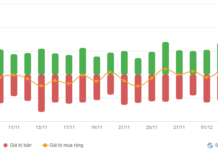There have been many instructions, dispatches, recommendations, and amendments from the Government. The Ho Chi Minh City Real Estate Association (HoREA) has also continuously issued documents and recommendations to the National Assembly, the Government, ministries, and local authorities. These include suggestions, amendments, and recommendations for decrees and regulations that best support the resolution of difficulties and contribute to the recovery and healthy development of the market. The People’s Labor Newspaper interviewed Mr. Le Hoang Chau, Chairman of HoREA, on this issue.
– Reporter: As the Chairman of the Ho Chi Minh City Real Estate Association (HoREA), can you share an overview of the 2023 market, as well as your insights into the real estate market, especially in Ho Chi Minh City, in the past year?
 Mr. Le Hoang Chau |
+ Mr. Le Hoang Chau: I have to admit that 2023 has been a year of many “emotions” for those in the real estate industry, policymakers, businesses, investors, and residents. As we know, legal obstacles account for 70% of the difficulties in the real estate market, resulting in a scarcity of supply and policies that further hinder businesses. Legal issues concerning licenses for projects and other legal procedures have affected the progress of projects, leading to a stagnation in the market, a lack of liquidity, and difficulties for businesses in raising capital…
HoREA and I have closely monitored the market and continuously made recommendations on emerging issues that we believe are necessary for the real estate market and businesses.
In 2023, we submitted nearly 180 documents to the Government, ministries, and local authorities, making recommendations on all relevant aspects related to the real estate market, buyers, customers, businesses, and policy matters.
I have also proposed important contents related to corporate bonds, interest rate reductions, credit room, a VND 120 trillion credit package, as well as amendments and suggestions for draft laws related to real estate such as the Land Law (amendment), Real Estate Business Law, Housing Law, Credit Organization Law… In the first two months of 2024 alone, HoREA has sent more than 20 relevant letters.
However, the laws recently passed by the National Assembly will not take effect until the end of 2024 or the beginning of 2025. We hope this will be a positive turning point for the real estate market.

Mr. Le Hoang Chau |
– Among the recently passed laws (Real Estate Business Law, Land Law (amendment), Housing Law, Credit Organization Law), what positive aspects do you see that will contribute to the healthy development of the real estate market in the future?
+ Both I and the association wholeheartedly welcome the National Assembly’s approval of the laws related to real estate. These laws contain many important contents that will benefit the market once they officially take effect.
For example, the amended Land Law eliminates the “land price framework” and introduces “land price tables,” which will help align the market price with the land price.
I am pleased and believe that, in the near future, the process of granting “pink books” (land-use certificates) to residents will become more favorable. Their accumulated assets will be officially recognized and certified. The amended Land Law continues to regulate “granting land-use rights certificates and ownership rights associated with land for cases where households and individuals are using land without violating land-related laws, not falling under cases of unauthorized land allocation.” This is a significant and fundamental change in state management. Previously, before the amended Land Law in 2024, only the state agencies were responsible for granting land-use rights certificates, ownership rights, and other assets associated with land to households and individuals using land, leading to no locality being able to complete 100% of this task. For example, Ho Chi Minh City has granted over 99% of the certificates for land plots, but there are still some cases where households and individuals, who have been using the land stably for decades, have not been issued certificates.
– After everything that has been experienced, what motivates the real estate market to recover and develop sustainably in the future?
+ Most issues and challenges in the market have been closely monitored by the association, and detailed and specific recommendations have been made to create favorable conditions not only for businesses but also for the entire market. We represent the interests of businesses, investors, as well as the needs of buyers, citizens who deserve their own houses. After everything that has been experienced, currently, all businesses are making great efforts. They are repaying bond debts, maintaining operations, especially for struggling businesses that must find ways to survive. The experiences have taught businesses the importance of prudence, sound financial management, and proper legal compliance to avoid collapsing.
In 2023, the economy and the real estate market gradually moved towards the positive direction until the end of the year. Policy obstacles were gradually resolved, and local leaders actively accompanied businesses to overcome difficulties and implement projects. Currently, businesses have started to recover, and even the most difficult corporations have shown positive signs.
In an environment of stable, low interest rates, along with significant efforts from businesses to implement projects, I believe that the real estate market in 2024 will be much more positive, creating a good development momentum for 2025.
Especially, there is still a high demand for investment, asset accumulation, and, most importantly, affordable housing for society, including social housing… which will be an opportunity and a driving force for the recovery and growth of the real estate market.
When legal obstacles related to investment in real estate projects, commercial housing, and social housing are removed, approximately 1,000 real estate projects throughout the country will be unlocked, creating favorable opportunities to access capital and restart projects to provide supply to the market.
|
“Most importantly, I believe that, from what has been experienced, real estate businesses must resolutely restructure, reinvest, and reorganize their housing products towards meeting real demand, lowering house prices to a reasonable level.” – Mr. Chau said. |
Son Nhung



































